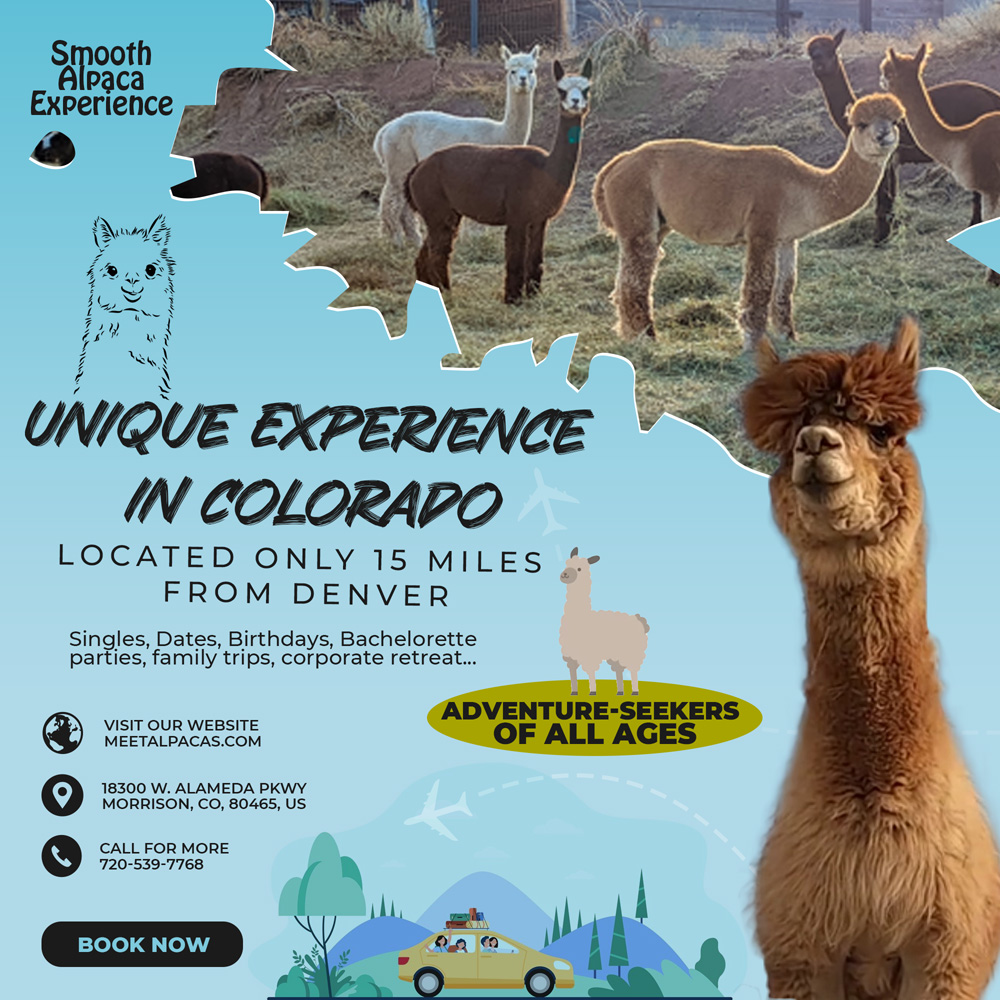Hot alpaca adventure tours and holiday advices in Denver, Colorado
Top alpaca adventures and holiday tips and tricks in Denver, Colorado: Alpaca farms offer more than just a chance to get closer to nature; they also promote sustainable farming practices. Alpacas have less impact on the environment than other livestock, largely due to their soft feet that prevent soil compaction and erosion. Their grazing patterns also help to promote biodiversity in pastures, and their manure (nicknamed “alpaca gold”) is a great natural fertilizer. Additionally, alpacas have a longer lifespan and a high reproductive rate, making them a more stable source of revenue for farmers. Find additional details on alpaca adventures in Colorado.

Keeping alpacas comfortable is essential, so you’ll want to ensure that their indoor living spaces are well-ventilated. They need to be able to stay cool in the summer, as sustained heat and humidity can lead to dehydration and other problems. You’ll also need to make sure they have access to clean water throughout the year. You might provide a water misting fan, use water coolers in the barn, or have a pond or kiddie pool for them to bathe in when needed. These simple things help to keep your alpacas healthy and happy.
Here’s why an alpaca experience is perfect for your upcoming trip to Denver. Alpacas are adorable, fluffy, and friendly animals. People are often surprised by just how sociable they are and how much they enjoy human affection. They are also incredibly calm creatures with steady temperaments. This makes them perfect for the whole family. They don’t display erratic behavior, making them more predictable around children.
As herbivores, alpacas only eat vegetation. They eat mostly grass, but their diets can also include leaves wood, bark or stems. Like other ruminants, alpacas have a three-chambered stomach that digests the roughage efficiently. Unlike other grazers, alpacas don’t eat much. According to the Alpaca Owners Association, a 125-lb. (57 kg) animal only eats around 2 lbs. (907 grams) per day. In general, alpacas eat 1.5 percent of their body weight each day.
Additionally, if you have any accessibility concerns that make hiking impossible, then there are also places to sit down next to the alpacas, which makes this activity available to everyone regardless of their ability or needs. The Smooth Alpaca Experience just so happens to have scenic mountain views of Red Rock Park. Yes, that’s right, the iconic Red Rocks Park and Amphitheatre where hundreds of concerts are held each year. Combine a visit to the venue with an alpaca experience. Are you looking for an educational opportunity for your kids? Come enjoy an alpaca experience that’s not only fun but also informative. This alpaca experience takes place on a fiber farm. This type of farm raises animals like alpacas, sheep, goats, llamas, angora rabbits, and more for their fleece and wool.
Do alpacas make noise? Alpacas are very quiet, docile animals that make a minimal amount of sound. They do make a humming sound as a means of communication or to express concern or stress. Most communication between alpacas is nonverbal. Occasionally you will hear a shrill “alarm call,” which usually means they have spotted something of concern nearby, and they are warning others in the herd. The concern may be a predator, or may be something they are not familiar with, like a cow or horse in a neighboring field. Male alpacas also “serenade” females during breeding with a guttural, throaty sound called “orgling.” Read even more details at https://meetalpacas.com/.
Are alpacas dangerous? No. Alpacas are pleasant to be around and generally easy to handle. Alpacas do not head-butt. They do not have horns or hooves like other livestock. They move gracefully and adroitly about the field and are therefore unlikely to run into or over anyone intentionally. Males develop sharp fighting teeth at about three years of age which can cause injury to both humans as well as other alpacas. Alpacas will reflexively kick with a hind leg, particularly if surprised from behind. While the impact of an alpaca kick is not on par with a horse, it can create a bruise. Also, there is potential for toenails to cut skin.
So what do you DO with these animals? Alpacas are raised for their soft and luxurious fleece (fiber). Each shearing produces roughly five to ten pounds of fleece per animal, per year. This fleece, often compared to cashmere, can be turned into a wide array of products from yarn and apparel to tapestries and blankets. The fleece itself is recognized globally for its fineness, softness, light weight, durability, excellent thermal qualities, and luster.
Alpacas are very social creatures. They are gentle and curious and with training can become great pets, according to Switzer. Herds often include animals of different species or taxonomic families, such as llamas, goats and sheep, according to the FAO. Alpacas spit when they are distressed or feel threatened. They will sometimes spit at each other when they are competing for food or trying to establish dominance, according to Switzer. They won’t spit at people or bite unless they have been abused.
